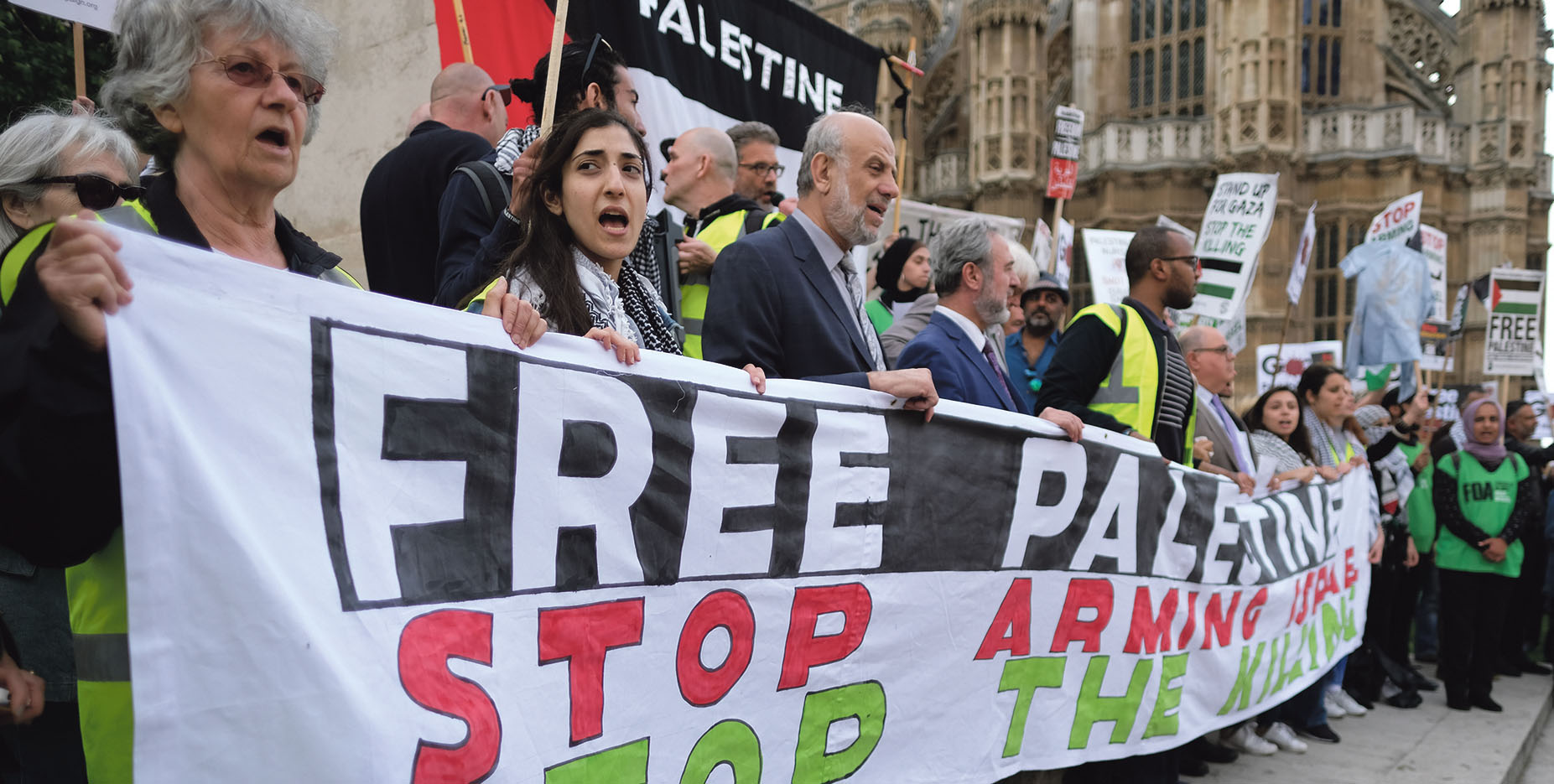
Nadine Osman
Human rights campaigners have said that the UK Government has “no excuses left” not to immediately halt all arms exports to Israel following the International Court of Justice’s (ICJ) ruling that there is plausible evidence Israel is committing genocide against Palestinian people in Gaza.
In a statement issued following the ICJ’s ruling, Campaign Against Arms Trade (CAAT) said the UK has ‘a legal obligation to stop arms exports if there is a clear risk; they could be used in violations of International Humanitarian Law (IHL) and under the Genocide Convention, which places obligations on states to take action to prevent and punish genocide.’
The ruling found that the court had jurisdiction and evidence to take the case further. It also authorised interim measures due to the “real and imminent risk of irreparable prejudice” to the rights of Palestinian people under the Genocide Convention.
Foreign Secretary David Cameron proposed continuing arms sales to Israel on December 12, 2023, despite previous Foreign Office evaluations indicating “serious concerns” about IHL violations and Israel’s resolve and ability to comply with IHL.
Cameron further accepted that Israel has a different interpretation of IHL.
During a debate on Children in Gaza, in the House of Lords on February 13, Baroness Bennett of Manor Castle of the Green Party asked Cameron whether the government would “stop all arms shipments to Israel, as a Dutch court has demanded that the Netherlands does”, Cameron did not answer the question.
One of the interim measures implemented by the ICJ is for Israel to “prevent and punish the direct and public incitement to commit genocide.” This was due to statements made by senior Israeli politicians and military leaders.
These statements were considered by the Foreign Office Assessment Unit as part of its review on November 10, 2023. However, while such statements caused concern, the unit dismissed them, stating: “It is not possible to define clearly what may be political rhetoric for a domestic audience and what speaks to the conduct of the campaign.”.
According to CAAT, the UK has, since 2015, licenced over £487 million worth of arms to Israel under single-issue licences.
However, CAAT claims that this figure excludes open licences, which allow arms companies to export limitless amounts of specific equipment without further reporting requirements. One of these open licences is for components for the F35 stealth combat aircraft that Israel is currently using to bombard Gaza.
UK industry makes 15 per cent of each F35, and Campaign Against Arms Trade estimates the value of the F35 contract is at least £336 million since 2016. These figures do not include licences issued since October 7 due to a lag in reporting arms export data.
In a statement to The Muslim News, CAAT’s spokesperson, Emily Apple, said, “This government and the UK arms industry are complicit in genocide. The ICJ ruled that Israel needs to take immediate action. But it’s not just Israel that needs to act.
“This government must stop putting the profits of arms companies above the lives of Palestinians. The Foreign Office assessment unit has found excuse after excuse to ignore and dismiss allegations that Israel is committing IHL violations. Enough is enough.
There are no excuses left. This government must call for a ceasefire and stop arms exports to Israel immediately.”
Before the ICJ ruled, a coalition of UK-based civil society groups working in and on the Occupied Palestinian Territory wrote to the UK government, urging the government to stop all arms exports to Israel.
The letter, which was signed by several prominent human rights NGOs, including Amnesty, CAAT, and Human Rights Watch, called on the government to ‘immediately suspend both existing licences for military equipment and technology and the issuing of new licences while the Israel Defence Forces continue to carry out widespread serious violations, including war crimes, with impunity.’
The letter, published on December 12, 2023, clarifies that, under relevant international and domestic law, the UK is required to prevent the transfer of military equipment and technology, including parts and components, where there is a clear or overriding risk that such equipment and technology might be used to commit or facilitate a serious violation of international humanitarian law or international human rights law.
These binding obligations are contained within Articles 6 and 7 of the International Arms Trade Treaty (ATT) as well as criteria one and two of the UK’s Strategic Export Licencing Criteria (SELC).
Criteria three and four of the SELC also prohibit the granting of a licence when there is a clear risk that the items would, overall, undermine peace and security. International law also prohibits the UK from providing weapons with the knowledge that they would significantly contribute to unlawful attacks.
In December, the UK’s Defence Secretary, Grant Shapps, apparently sought to minimise the importance of UK arms transfers to Israel, saying the quantities were “relatively small.”
There is mounting opposition to the UK’s continued arming of Israel, with hundreds of people protesting outside defence factories in Brighton, Glasgow, Bournemouth, and Lancashire since the start of Israel’s bombing of Gaza.
On January 23, the Israeli Defence Ministry, led by Eyal Zamir, announced that his country had finalised three major military aircraft sales from the
US as it continues to bomb Gaza.
The purchase of 25 F-35 fighter jets, 25 F-15 fighter jets, and a new squadron of Apache attack helicopters, possibly involving 12 units, was finalised last month. These jets and helicopters will reportedly be paid for using the US aid provided to Israel.
Zamir, along with other officials, held a series of meetings in Washington with senior Pentagon and State Department officials.
The Israeli officials met with arms dealers, namely Lockheed Martin, the manufacturer of the F-35, and Boeing, the manufacturer of the F-16 and Apache.
In November, it was announced that Germany had increased arms exports to Israel tenfold in a single year. According to the German Economic Ministry, Germany exported almost €303 million (£258 million) to Israel in 2023, compared with €32 million (£27 million) the previous year.
Photo: Demonstrators gather outside the British Parliament on June 5, 2018, to protest against UK arm sales to Israel.(Credit: Alisdare Hickson/Flickr CC)
GAZA SIEGE | SPECIAL COVERAGE
Editorial pro-Israeli MPs demonising Palestinian advocates a deflection of moral bankruptcy
Austrian LitFest drops award winning Bosnian author over criticism of Israel
Palestine remains the issue at the Doha Forum
Young Americans think Israel is committing genocide in Gaza
Colossal spike in anti-Muslim and anti-Palestinian incidents reported in US
Masked demonstrators could face arrest under new anti-protest laws
Muslim council cancels meeting with Trudeau over stance on hate crimes and Gaza


